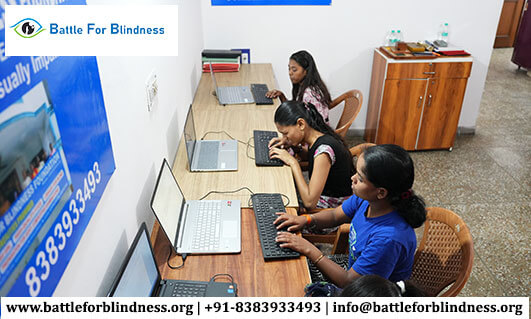
Navigating the professional world as a visually impaired individual presents unique challenges. However, with the right strategies, tools, and mindset, visually impaired professionals can build successful and fulfilling careers. Here’s a guide with actionable tips to help overcome employment obstacles and excel in the workplace.
1. Leverage Assistive Technology
Advancements in assistive technology have significantly leveled the playing field for visually impaired individuals. Tools like screen readers (JAWS, NVDA), magnifiers, and braille displays can make computer-based tasks accessible, while voice-to-text software can enhance productivity in document creation.
- Tip: Familiarize yourself with the latest tools in your industry, and advocate for any additional software that might help you perform your job more efficiently.
2. Pursue Specialized Training and Certifications
In today’s competitive job market, acquiring specialized skills can make you stand out. Training programs tailored to visually impaired professionals provide targeted support to develop in-demand skills.
- Tip: Seek out workshops, online courses, or certifications in fields like data analysis, programming, or digital marketing. Many organizations, including nonprofits, offer training specifically for visually impaired individuals.
3. Network and Build Connections
Networking is essential for career advancement, and it’s a skill that can be developed over time. Engage with professional networks, attend industry conferences, and connect with others through social media platforms like LinkedIn.
- Tip: Join groups that focus on disability inclusion and career development for visually impaired professionals. Building relationships with others who understand your challenges can provide mentorship and support.
4. Understand Your Rights
Knowing your rights is essential in advocating for accommodations in the workplace. In many countries, laws require employers to provide reasonable accommodations, which might include assistive technology, modified workspaces, or flexible schedules.
- Tip: Familiarize yourself with laws like the Americans with Disabilities Act (ADA) in the U.S. or similar legislation in your country. Understanding your rights empowers you to request necessary accommodations.
5. Prepare for Interviews with Confidence
Interviewing can be daunting, but with the right preparation, you can highlight your strengths and abilities. Practice answering questions about your experience and consider how you will discuss your visual impairment, emphasizing your problem-solving skills and adaptability.
- Tip: Bring examples of previous work or testimonials to demonstrate your capabilities. Research the company’s policies on diversity and inclusion, as this can give you insight into their work culture.
6. Consider Remote Work Opportunities
Remote work has become increasingly popular and accessible. Many visually impaired professionals find remote work to be a flexible option that allows them to control their environment and use preferred assistive tools.
- Tip: Explore job boards that focus on remote opportunities, such as Remote.co or FlexJobs. Some organizations also focus specifically on hiring individuals with disabilities, offering a supportive community and inclusive environment.
7. Practice Self-Advocacy and Resilience
Self-advocacy is about understanding and communicating your needs effectively. In the workplace, being proactive about accommodations and voicing your needs can lead to a more supportive environment. Resilience, or the ability to bounce back from setbacks, is also crucial for long-term success.
- Tip: Practice communication skills and be prepared to articulate your strengths and the accommodations that will help you perform at your best. Building resilience involves setting realistic goals and learning from each experience.
8. Stay Informed on Industry Trends
Keeping up with industry trends and developments can help you remain competitive. Attend webinars, read industry publications, and participate in online forums to stay informed and updated on changes within your field.
- Tip: Set up Google Alerts for topics related to your career interests, and follow industry leaders on social media. This will help you stay aware of new opportunities and developments in your area of expertise.
9. Connect with Support Organizations
Numerous organizations offer support and resources for visually impaired professionals. Organizations like the American Foundation for the Blind (AFB) and the National Federation of the Blind (NFB) offer job boards, mentorship programs, and other resources to support career growth.
- Tip: Join groups and forums where you can meet other visually impaired professionals. Support organizations can provide valuable networking opportunities, access to resources, and information on available services and accommodations.
10. Embrace a Growth Mindset
Adopting a growth mindset—believing in your ability to develop skills and overcome challenges—can be a game-changer. This mindset encourages continuous learning and helps you stay motivated, even in the face of obstacles.
- Tip: Regularly set new goals and reflect on your progress. Celebrate your achievements and use setbacks as learning experiences. Embracing a positive outlook can keep you motivated and open to new opportunities.
Conclusion
Employment challenges are part of the journey for any professional, and visually impaired individuals are no exception. However, by leveraging technology, advocating for necessary accommodations, and continuously building skills, visually impaired professionals can thrive in diverse careers. With resilience, confidence, and a willingness to embrace change, you can build a fulfilling career that reflects your strengths and passions.





